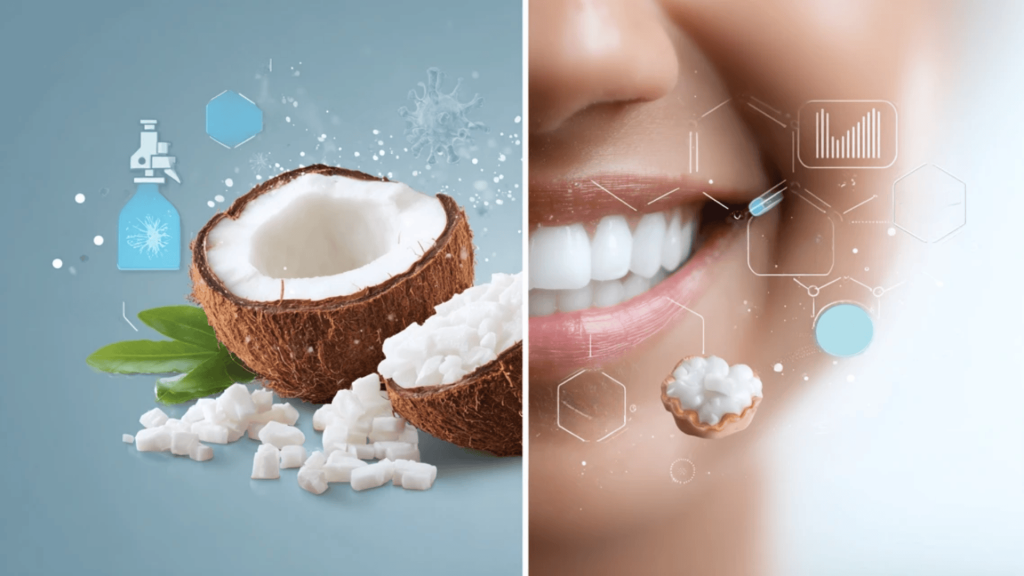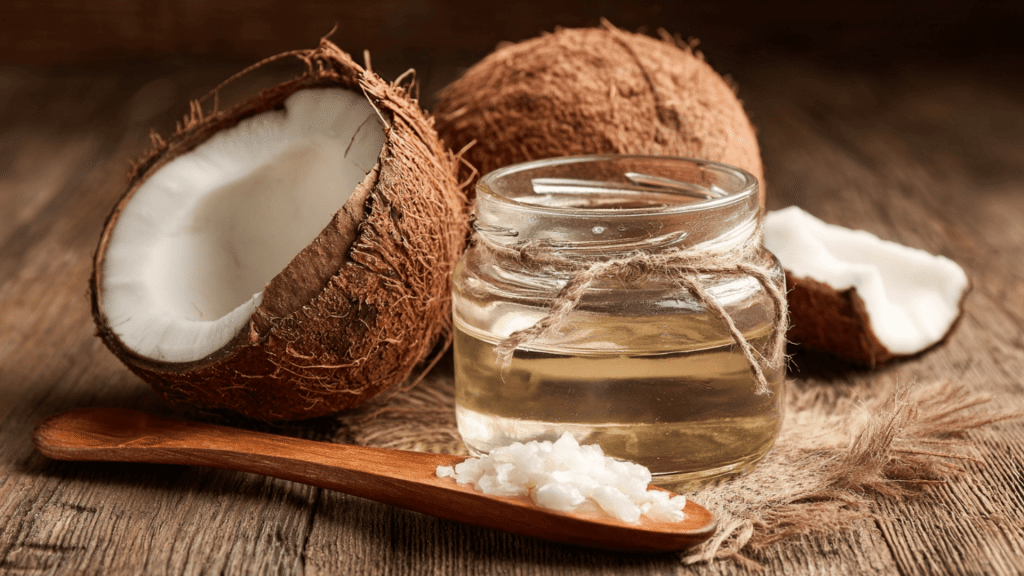Have you ever wondered if something as simple as coconut oil could brighten your smile? You are not alone.
Many people are curious and ask, Does coconut oil whiten your teeth while looking for natural and safe ways to care for their teeth.
The simple answer is yes, but only to a small degree. Coconut oil does not bleach your teeth like whitening strips do.
However, it may help remove surface stains and improve overall oral health. This gentle process, called oil pulling, comes from traditional Ayurvedic medicine and has become popular in today’s dental care routines.
In this blog, we will explain how coconut oil works, what science says about it, and whether trying it makes sense for your smile.
How Coconut Oil is Supposed to Work on Teeth
Coconut oil doesn’t bleach or lighten your teeth the way hydrogen peroxide does. Instead, it may help by cleaning away surface stains and bacteria.
This process is called oil pulling, a centuries-old practice that involves swishing oil in your mouth for 10–20 minutes, then spitting it out.
Here’s the idea: Coconut oil is rich in lauric acid, which has antibacterial and anti-inflammatory properties. When you swish it around, the oil binds with plaque, bacteria, and leftover food particles.
Over time, this may reduce yellowing caused by buildup and make your teeth look cleaner and shinier.
That’s why people often refer to it as coconut oil teeth whitening, even though it doesn’t bleach your enamel. It’s more of a polishing method than a whitening treatment in the traditional sense.
What the Research Says: Is Coconut Oil Effective for Whitening?

Let’s talk science. There’s not a ton of research specifically proving that coconut oil whitens teeth, but a few small studies do support its oral health benefits.
One study in the Nigerian Medical Journal found that oil pulling with coconut oil helped reduce plaque and gingivitis after just one week. Less plaque = cleaner-looking teeth, which can make them appear whiter.
Another study published in the Journal of Contemporary Dental Practice observed that oil pulling can significantly reduce harmful bacteria like Streptococcus mutans, which is linked to cavities and bad breath.
So while it doesn’t bleach your teeth like peroxide, the reduction in plaque and buildup might give your smile a subtle brightness. It’s more about helping your natural tooth color shine through.
Other Dental Benefits of Coconut Oil
Aside from its light polishing effect, coconut oil offers several other oral health perks:
- Fights harmful bacteria: Lauric acid kills germs that cause tooth decay and bad breath.
- Reduces inflammation: Coconut oil may calm gum swelling and irritation.
- Freshens breath: By lowering bacteria, it can reduce morning breath or lingering smells.
- Improves gum health: Some users report reduced bleeding and tenderness after consistent oil pulling.
Though more research is needed, the current evidence suggests coconut oil might help create a cleaner, healthier mouth overall. It’s not just about whitening, it’s about wellness.
Should You Try Coconut Oil for Teeth Whitening?
Coconut oil sounds promising, but is it actually worth the effort? Here’s a quick look at the main benefits and drawbacks to help you decide.
| Pros | Cons |
|---|---|
| Natural and chemical-free | Takes time to see results |
| Budget-friendly (just one ingredient) | Does not bleach enamel |
| Safe for everyday use | It can feel uncomfortable to swish for 20 minutes |
| May improve overall oral hygiene | Not a replacement for dental visits |
| Easy to do at home | Results are subtle, not dramatic |
If you’re looking for a natural way to support your smile, it’s worth considering.
How to Try Coconut Oil Teeth Whitening Safely

Thinking of giving it a try? Here’s a simple step-by-step guide to get started with oil pulling:
- Choose your oil: Use virgin or cold-pressed organic coconut oil for best results.
- Start small: Scoop 1 tablespoon of oil (or 1 teaspoon if you’re just starting).
- Swish gently: Move the oil around your mouth for 10–20 minutes. Don’t gargle or swallow it.
- Spit it out: Into a trash can (not the sink, it can clog pipes!).
- Rinse and brush: Rinse with warm water and brush your teeth afterward.
Do this once a day, preferably in the morning before eating. You might notice your teeth feel smoother and your breath smells fresher within a week or two.
Tip: Don’t expect dramatic whitening like store-bought kits. The goal here is gradual improvement.
Coconut Oil vs. Other Whitening Methods
Here’s how coconut oil teeth whitening stacks up against more conventional options:
| Method | Whitening Strength | Safety | Cost | Speed |
|---|---|---|---|---|
| Coconut Oil | Mild (surface stains) | Very safe | Low | Slow (weeks) |
| Whitening Toothpaste | Mild | Safe | Low | Medium |
| Whitening Strips | Moderate to strong | Mostly safe | Moderate | Fast (days) |
| Professional Bleaching | Strongest | Dentist supervised | High | Fast (1–2 sessions) |
Coconut oil is best for people looking for a gentle, side-effect-free method. It’s not ideal for dramatic changes, but it’s great for maintenance.
Expert Opinions & Dentist Recommendations
Most dentists agree that oil pulling with coconut oil is safe, but should not be seen as a replacement for standard dental care.
Dr. Marc Lowenberg, a cosmetic dentist in New York, says oil pulling is not harmful but not a substitute for brushing, flossing, and professional cleanings.
He emphasizes that while coconut oil may help clean your mouth, it cannot replace proper hygiene practices or professional dental treatments.
Dr. Jessica Emery, founder of Sugar Fix Dental Loft, says oil pulling can help reduce harmful bacteria and improve oral freshness, but it will not whiten teeth the way professional treatments do.
She supports coconut oil as a natural oral care booster but stresses it will not deliver the same whitening effects as peroxide-based options.
Dr. Susan Maples, Michigan-based dentist and author, says it is a nice addition for people who want natural options, but it is not a magic solution. Use it alongside your regular routine.
Dr. Maples encourages natural remedies like coconut oil but reminds users to keep their expectations realistic and continue traditional oral care routines.
Making The Decision
So, does coconut oil whiten your teeth? It might help reduce surface stains and improve overall oral health, but it will not bleach your enamel or deliver dramatic results.
Think of it as a natural, gentle addition to your dental routine rather than a replacement for traditional whitening methods.
Many people find it helpful for keeping their mouths clean, fresh, and healthy when used consistently.
If you are looking for a safe and affordable way to support your smile, coconut oil is worth considering. Just keep your expectations realistic.
Ready to give coconut oil a go? Start your oil pulling routine today and see how it works for you, your smile might thank you.
Frequently Asked Questions
How Long Does It Take to See Results?
Some people notice cleaner teeth in one week. Whitening, if any, may take a few weeks of consistent, daily oil pulling.
What Kind of Coconut Oil Should I Use?
Use cold-pressed, virgin, or organic coconut oil. These are pure and free from additives that could reduce effectiveness or irritate your mouth.
Can It Damage Enamel?
No. Coconut oil is gentle and non-abrasive. It does not contain harsh acids or chemicals that can harm or weaken your tooth enamel.
Should I Brush Before or After?
Brush after oil pulling to help rinse away any loosened bacteria, debris, and oil left in your mouth for best results.






